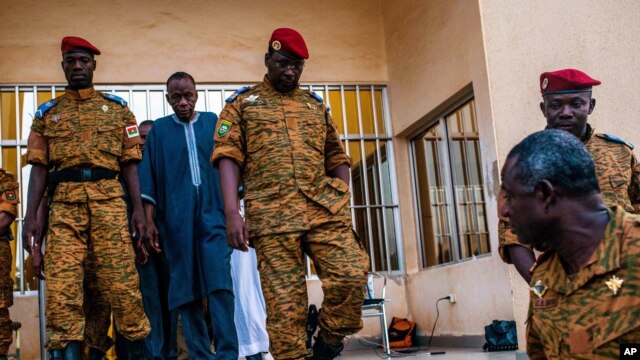
Burkina Faso Lt. Col. Issac Yacouba Zida, center, leaves a government building after meeting with political leaders in Ouagadougou, Burkina Faso, Nov. 4, 2014.
The African Union (AU) has welcomed as a positive development the agreement between Burkina Faso’s military, opposition and civil society groups to a framework on a transitional administration that will lead the country to the next election after angry protesters forced longtime leader Blaise Compaore to step down and flee into exile.
Jacob Enoh Ben, spokesperson for the AU Chairperson Nkosazana Dlamini Zuma, said the continental organization is hopeful that all Burkinabe stakeholders including the military leadership will expedite the implementation of the agreement to ensure the West African country quickly restores constitutional rule.
“It’s a welcome indicator of progress between the stakeholders within Burkina Faso to have the current military leadership have conversation with the civilians …to really chat a way forward for Burkina Faso in a manner that is agreeable to have reached this kind of consensus,” said Ben.
“We are looking forward to them signing it hopefully between today and tomorrow, and hopefully, thereafter they would be able to appoint a civilian-led government of transition that would definitely take the country through the transition phase that will end up in election,” he said.
Ben said the African Union will continue with its support to Burkina Faso. This came after the AU recently named former Togolese Prime Minister Edem Kodjo as a special envoy to lead a team to Burkina Faso in a bid to ensure the country’s stability as well as help the West African nation maintain its territorial integrity.
Critics say the AU appeared to have misjudged the situation in Burkina Faso after issuing a two-week ultimatum demanding the military to hand over power to a civilian lead transitional government. The Burkinabe military failed to heed the ultimatum, which many feared could lead to sanctions.
Ben said the criticism is unjustified. He said the AU worked closely with West African leaders to help the situation there. The effort, Ben said, led to leaders, including Ghanaian President John Dramani Mahama, Nigerian President Goodluck Jonathan and Senegalese President Macky Sall, to visit Burkina Faso to hold talks with the military leadership.
“The AU thought rather than slamming in sanctions immediately, it could have been counterproductive but, rather it was important to give a reasonable period of time, two weeks as the [Peace and Security Council] decided, during which they hoped the transition would have happened,” Ben said.
He said it is unlikely the West African country would face sanctions following the agreement between the country’s leadership to soon name a transitional administration.
“Things are progressing well as we see and we are hoping that by the time the Peace and Security Council meets again next week, the Burkinabe stakeholders would have signed the charter, which they agreed to….” he said. |
|
